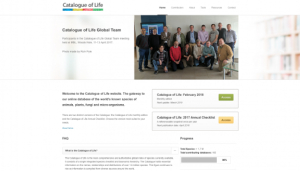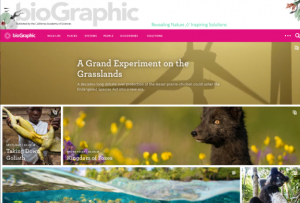 |
March 30, 2018 Volume 24, Number 13 |
Research and Education |
General Interest |
Network Tools |
Revisited |
In the News |
Research and EducationBack to Top | |
 |
|
 |
|
 |
|
 |
|
 |
|
 |
|
 |
|
General InterestBack to Top | |
 |
|
 |
|
 |
|
 |
|
 |
|
 |
|
 |
|
Network ToolsBack to Top | |
 |
|
 |
|
RevisitedBack to Top | |
 |
|
In the NewsBack to Top | |
As Antibiotic Use Surges, Scientists and Health Professionals Seek to Fend Off Antibiotic Resistant Superbugs | |
|
Surge in Antibiotics is a Boon for Superbugs PBS Newshour: The problem with overusing antibiotics Discovery of MRSA-busting antibiotic gives hope against resistant superbugs A new class of synthetic retinoid antibiotics effective against bacterial persisters NCBI: The Antibiotic Resistance Crisis W.K. Kellogg Biological Station: Antibiotic Resistance Lesson On Monday, an international team of scientists published an article in Proceedings of the National Academy of Sciences of the United States of America revealing that the use of antibiotics has greatly increased over the past two decades. According to the study, which was headed by Eili Klein of the Center for Disease Dynamics, Economics, and Policy, antibiotic use around the globe increased 65% between 2000 and 2015. The report, which examined antibiotic use in 76 countries, revealed that much of the increase was due to higher use in low and middle-income countries. For example, antibiotic use during this time period doubled in India and rose 79% in China. On one hand, as noted in a recent PBS Newshour episode dedicated to the topic, increased use of antibiotics in these countries suggests that individuals have greater access to antibiotics than they did in the past. However, this increase is also cause for alarm because the increased use of antibiotics has fostered the growth of antibiotic-resistant microbes, or "superbugs." While healthcare workers around the world seek to reduce unnecessary antibiotic use, scientists are also trying to develop new drugs that are capable of fighting these superbugs. On Thursday, a team of scientists from the Rhode Island Hospital in Providence published a study in Nature outlining their discovery of two new antibiotics that may help combat MRSA (Methicillin-resistant Staphylococcus aureus). While this discovery offers hope, the team found these new antibiotics were not effective against other bacteria, including bacteria that cause pneumonia, gonorrhea, and the plague. [MMB] The first two links this week take readers to helpful summaries of the PNAS study. These studies come from Jason Beaubien from NPR and Laura Santhanam of PBS Newshour. The link to the PBS Newshour article also includes a video clip from a recent Newshour episode about the study. The third link takes readers to an article authored by Ian Sample of The Guardian, about the recent study from Rhode Island Hospital. Those interested in reading that study in full may do so via the fourth link. Those interested in learning more about antibiotic resistance may want to check out the fifth link, which is an article published by the National Center for Biotechnology Information (NCBI). This article includes a number of infographics that may especially appeal to individuals who are teaching the topic. Finally, the last link is to a K-12 lesson plan about antibiotic resistance. This lesson plan was created by Heather Kittredge at a recent workshop by the W. K. Kellogg Biological Station at Michigan State University. | |





